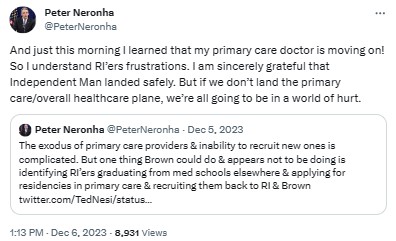
To solve the doctor shortage, all RI has to change is everything.
This has been lingering around my to-do list for a while, but the problem is only getting worse, so for the foreseeable future, it’s an evergreen topic in Rhode Island:

Yes, this is a massive problem permeating all of our society, and there’s only so much a small state like Rhode Island can do about global matters, but everything I can think of that Rhode Island does, or that its current political class would be willing to do, makes things worse for us.
In one bucket, put all of Rhode Island’s impositions. The state has high taxes, of course, which make it less attractive to have a high-earning job in this area. But we also impose all sorts of labor mandates, from a high minimum wage to mandates for paid time off to high insurance mandates that drive up costs. Then there are healthcare and insurance mandates, which add additional costs into healthcare, as well as burdens for providers, including documentation. Naturally, the artificially high price of our “green energy” requirements drive up the cost of living and doing business here.
Now turn to the sort of life young high-earners tend to want to live. Even East Greenwich can’t keep up its school system, and as we’ve just discovered with the Washington Bridge, we’re subject to bad roads and (now) the threat of not being able to get where you need to go elsewhere in the state.
But that’s not all! The growing influence of progressives in our state government and the labor unions that constitute our shadow government mean people who make a lot of money are constantly in the crosshairs… unless they work for the state, of course, or are in another protected insider group. If they’ve invested years of their lives and hundreds of thousands of dollars in education and are working independently, they’re a target, at least for the insinuation that there must be something morally wrong about them.
Unfortunately, I’m not in a position to do a think-tank-style research report on what policies are truly affecting doctors and what reforms might help (Although, anybody interested funding one should contact me!), but you can bet policymakers in our state haven’t a clue and aren’t seriously interested in developing one. Indeed, they probably deep down suspect that too much investigation would turn the spotlight of culpability on them and their allies.
So, as written by Attorney General Neronha (who, by the way, gives no indication that he’d be any different among his government peers), “we’re all going to be in a world of hurt.”
